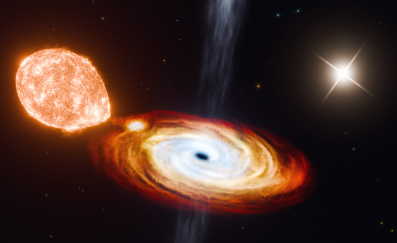Scientists Discover First Black Hole Triple System
A groundbreaking study has revealed the existence of a “black hole triple” system. This discovery marks the first time scientists have identified such a configuration in space. The system is located approximately 8,000 light years from Earth, in the constellation Cygnus. It features a central black hole, a star spiraling closely around it, and a more distant star.
About Black Holes
A black hole is a region in space with an extremely strong gravitational pull. This force is so intense that nothing, not even light, can escape from it. Most black holes form from massive stars that explode at the end of their life cycle, a process called a supernova. However, the newly discovered black hole challenges this traditional view.
The Black Hole Triple System
The black hole triple system consists of three components:
- A central black hole, V404 Cygni, which is about nine times the mass of our Sun.
- A star that orbits the black hole every 6.5 days.
- A second, more distant star that takes around 70,000 years to complete its orbit.
This configuration is different from the binary systems commonly observed, which typically have only one companion star.
Discovery Process
Researchers from the California Institute of Technology and the Massachusetts Institute of Technology conducted the study. They stumbled upon the distant star while examining astronomical data from various telescopes. This accidental discovery led to the realization that the two stars are gravitationally bound to the black hole.
Formation Theories
The study proposes a new mechanism for the formation of V404 Cygni. Instead of a supernova, it suggests a process called “direct collapse.” In this scenario, a massive star collapses under its gravity without exploding. This leads to the formation of a black hole without ejecting surrounding matter, a phenomenon referred to as a “failed supernova.”
The Implications of the Discovery
The existence of the black hole triple system raises intriguing questions about black hole formation. It suggests that some binary systems we observe might have originated as triples. Over time, the black hole could consume one of its companions, leaving behind a binary system.
Currently, V404 Cygni is in the process of consuming the star that orbits it closely. This means that the black hole triple will not remain intact indefinitely. The dynamics of the system will change as one star is devoured.
Significance of the Research
This discovery enhances our understanding of black holes and their formation. It challenges existing theories and opens new avenues for research. The findings were published in the journal Nature, indicating their significance in the field of astrophysics.
Month: Current Affairs - November, 2024
Category: Science & Technology Current Affairs






